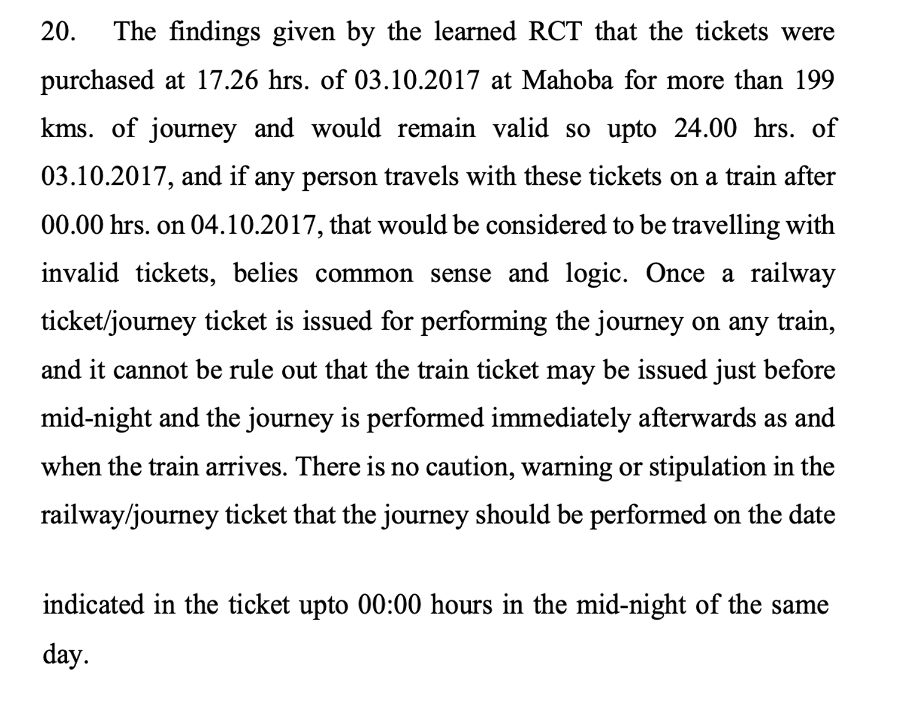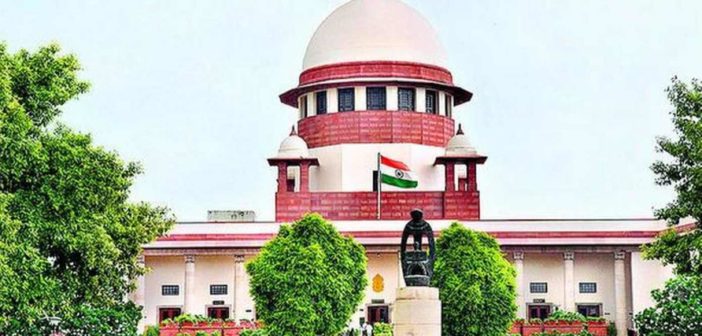In this edition of court judgments review, we look at the SC’s order that divorced wife remaining unmarried is entitled to level of maintenance reflective of the standard of living she enjoyed during the marriage, that mere Scolding of Student does not constitute Abetment of Suicide, AP HC’s order that wife filing false criminal case against husband is cruelty and ground for divorce, among others.
SC: Divorced Wife remaining unmarried is entitled to level of maintenance reflective of the standard of living she enjoyed during the marriage
The facts of the case in Rakhi Sadhukhan (Wife) vs. Raja Sadhukhan (Husband) were that the couple were married in 1997 and had a son in 1998. The husband filed for divorce in 2008, and over the years, several interim maintenance and litigation expense orders were issued to the husband by the lower courts.
In the final order, the High Court (HC) of Calcutta granted divorce in 2019, with the directions to husband to transfer ownership of the matrimonial flat to the wife and to continue pay permanent alimony of ₹ 20,000/- per month to the appellant-wife, subject to a 5% increase every three years.
Dissatisfied with the quantum of alimony, the wife appealed to the SC. She claimed the ₹20,000 was inadequate given the husband’s income and their former standard of living. The husband contended that he had remarried, had dependents, and his income was now lower.
The SC noted that the husband is drawing a salary of ₹ 1.64 lakhs per month. Thus, it held that a divorced wife who is unmarried is entitled to enjoy the level of maintenance reflective of the standard of living she enjoyed during marriage, and which reasonably secures her future.
Considering inflation, the wife’s dependence on maintenance, and the husband’s earning capacity, the SC enhanced the alimony to ₹ 50,000 per month with a 5% increase every two years. Though the court declined further financial directions for the adult son aged 26 years, it allowed voluntary support, if any, from the husband.
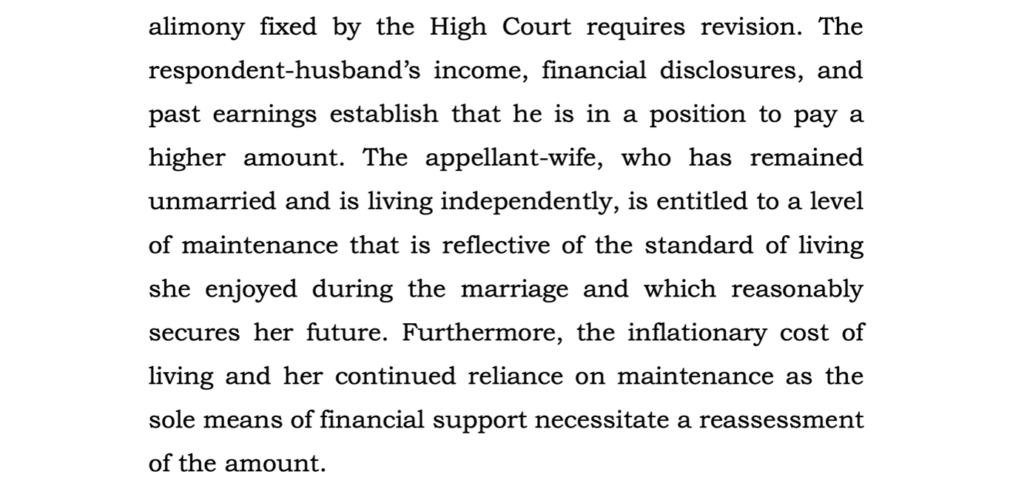
SC: Mere Scolding of Student does not constitute Abetment of Suicide
In Thangavel (School Correspondent & Appellant) vs. State of Tamil Nadu (Respondent), the school correspondent was charged with abetment of suicide after a student died by suicide following a reprimand. The case stemmed from another student complaining against the deceased, prompting the correspondent to scold him. The student later hanged himself.
The Madras HC had earlier refused to discharge him, though the appellant argued he had no personal enmity, and his actions were in line with his role as a school administrator to maintain order
The SC found no criminal intent which justified charges of abetment. It held that no reasonable person could foresee such an outcome of suicide from mere scolding, which was the least that a correspondent could do for disciplining students. Therefore, the SC set aside the charge and discharged the appellant.
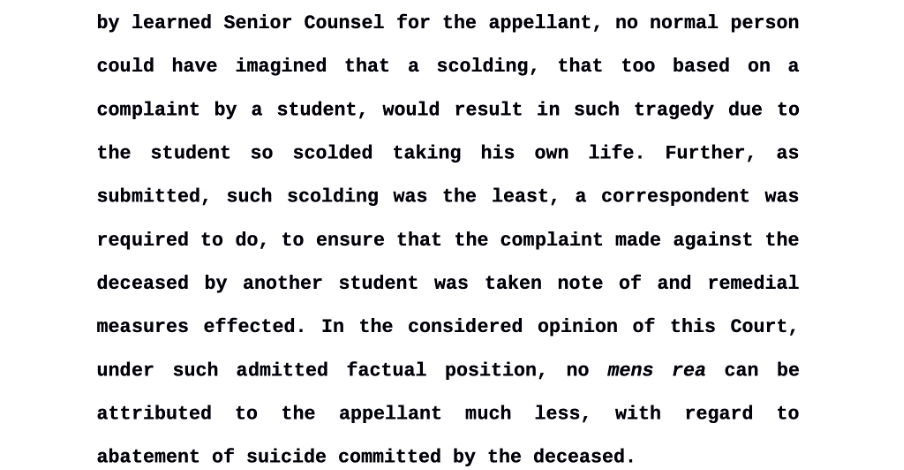
DCDRC: Orders ₹ 10 lakh compensation by hospital authorities for medical negligence and lack of necessary equipment
In the case of K. Ravi Kumar (Appellant) vs. Vitality Health Services & Others, the District Consumer Disputes Redressal Commission (DCDRC) in Hyderabad, Telangana directed the respondent-hospital to pay ₹ 10 lakh as compensation and an additional ₹ 50,000 towards litigation costs to the family of a deceased woman, who died due to medical negligence and absence of essential facilities.
The appellant’s wife, employed at the respondent hospital, underwent a Laparoscopic Hysterectomy and Bilateral Salpingo-Oophorectomy on 15 August 2021. She was administered general anaesthesia around 9:00 AM. Post-surgery, she developed hypoxia, a serious condition necessitating urgent ventilator support and intensive care, both of which were unavailable at the hospital. At about 3:00 PM, her family was asked to shift her to a hospital with the required facilities. However, the transfer was severely delayed as the hospital lacked a functioning lift, stretcher, and even an ambulance.
Eventually, around 5:30 PM, she was taken to another hospital where she was placed on ventilator support and administered treatment. Despite efforts, she passed away around 2:00 AM the following day, leaving behind her husband and two children
The family approached DCDRC with the above facts. The DCDRC held that this is a case which leads to the irresistible conclusion that, on all accounts, negligence and deficiency in service are quite apparent at the hospital. Therefore, the maxim ‘res ipsa loquitur’ (the thing speaks for itself) becomes fully applicable Accordingly, the commission ordered compensation and litigation costs to the deceased family.
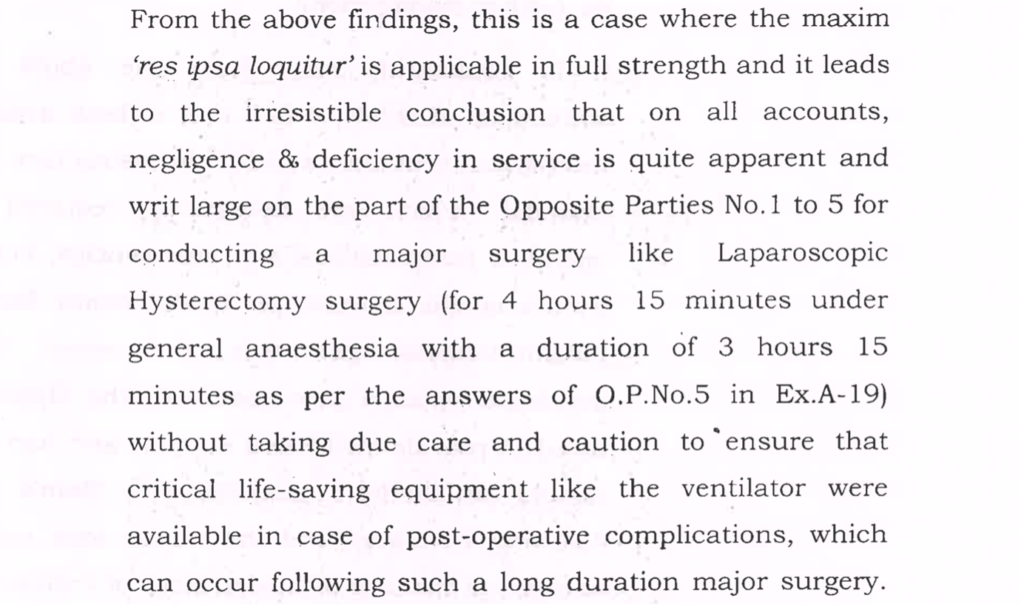
AP HC: Wife filing false criminal case against Husband is Cruelty and Ground for Divorce
In Appellant ‘X’ (Wife) vs. Respondent ‘Y’ (Husband), the Andhra Pradesh HC was dealing with an appeal filed by the wife challenging a divorce decree granted by the Trial Court under the Hindu Marriage Act (HMA), on the grounds of long separation and cruelty. The marriage between the parties was solemnised in 1994. The husband alleged that the wife had been unwilling to marry him, displayed abnormal behaviour soon after marriage, and never cohabited properly. He also alleged mental cruelty, citing various incidents and ultimately, the filing of a criminal complaint by the wife under Section 498-A IPC.
The wife denied these allegations, asserting that she performed her matrimonial duties and was harassed by the husband and his family for dowry. She claimed she filed a complaint in good faith and expressed a willingness to resume the marriage. However, the husband contended that the false criminal complaint caused serious mental agony and irreparably damaged the relationship.
The trial court granted the divorce on the grounds that the parties had been living separately for 29 years, and further, the criminal complaint earlier instituted by the wife had led to the husband and his parents’ arrest. Although it ended in acquittal, it caused mental cruelty to the husband. Accordingly, the divorce was granted. Wife approached HC against this order.
The HC emphasised that, as held in numerous prior judicial pronouncements, cruelty includes not just physical acts but also sustained mental harassment and trauma. It ruled that prolonged separation and the wife’s conduct demonstrated a complete breakdown of the marital bond. Accordingly, the trial court’s verdict was upheld.
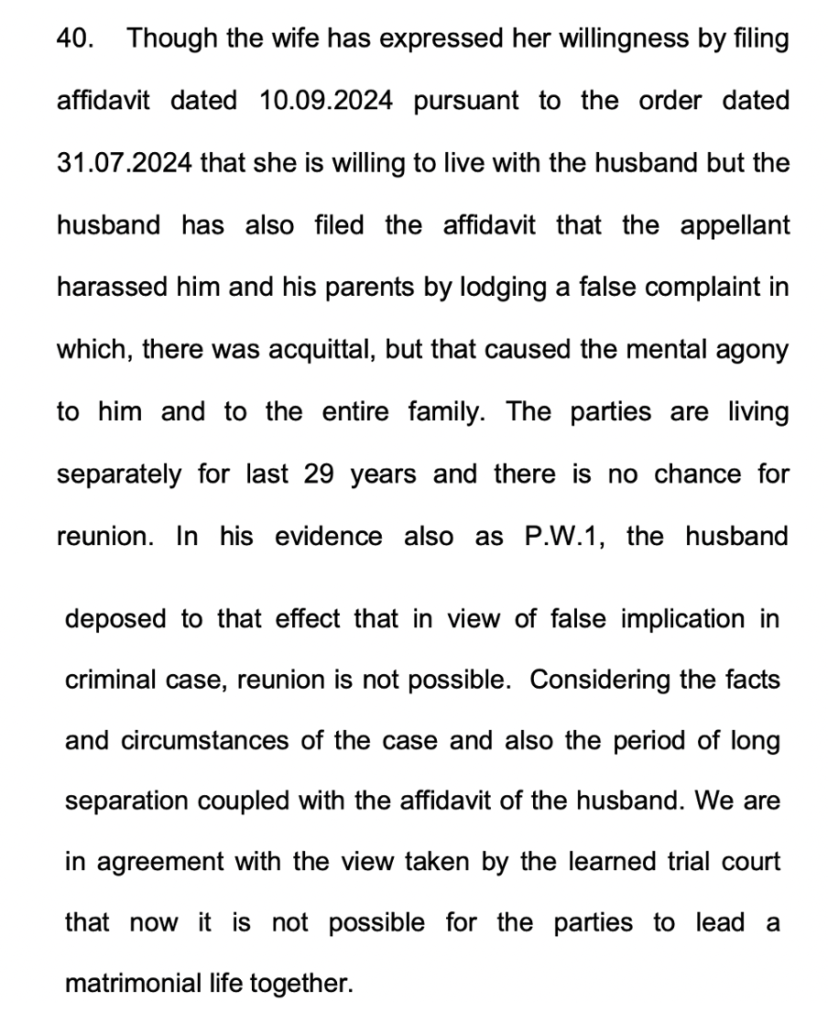
Delhi HC: Welfare Legislations should be interpreted liberally
In Sh. Kamtu Anuragi (Appellants) & Anr vs. Union of India, the appellants, parents of the deceased Lakhan Anuragi, challenged the order of the Railway Claims Tribunal (RCT), which denied them compensation under Section 124-A of the Railways Act.
Lakhan died after allegedly falling from the Mahakaushal Express near Bhandai Railway Station on 4 October 2017. The RCT acknowledged the incident as an “untoward incident” but dismissed the claim on the ground that Lakhan was not a “bona fide passenger” since the journey tickets were deemed invalid.
The RCT reasoned that the unreserved ticket was purchased on 03 October 2017 at 17:26 hours, but the travel started at only 00:55 hours on 4 October 2017. Since the deceased travelled on the following day, the ticket was held invalid. Thus, the claim for compensation was dismissed.
The HC found this interpretation flawed and perverse. It clarified that there is no statutory prescription limiting ticket validity strictly to midnight unless clearly mentioned on the ticket or relevant rules. The Court emphasised that welfare legislation like the Railways Act must be interpreted liberally. The fact that the deceased waited several hours at the station with his sister and nephew indicated a legitimate intent to travel.
The Court held that the deceased was indeed a bona fide passenger and a victim of an “untoward incident.” It set aside the RCT’s order and awarded compensation of ₹8,00,000 with 12% interest from the date of the incident.
